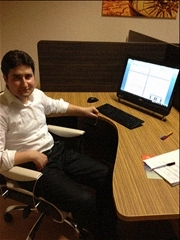Tutor HuntResources EFL Resources
Language Teaching In Turkish And British Schools
EAL (English as an Additional Language) in the UK
Date : 16/02/2015
Author Information

Uploaded by : Gokhan
Uploaded on : 16/02/2015
Subject : EFL
In this study, findings about the analysis of the EAL lessons at British primary schools in The UK were examined in comparison with Turkey in terms of oral production skills in order to find a more efficient way of teaching English at Turkish state primary schools to improve the speaking skills of the pupils in English. The results of the data analysis reveal that oral production is the most important element of language learning and it is supported by a variety of teaching techniques and strategies in The UK. Briefly, the following findings are available. Findings show that in Britain, teachers and authorities tend to give more importance to teacher professionalism, as one average teacher should have at least child protection certificate before working with children, and especially EAL teachers undergo a certain number of training programmes prior to teaching with pupils learning EAL, and that could be a remedy for the case of Turkey to heal the gaps between the expected and accepted in EFL teaching to improve speaking.
In terms of the research questions from the aspect of teaching oral production skills at primary schools, the findings reveal that the five questions of this thesis receive a highly positive correspondence from The UK side of English language teaching.
First, there is a preference for specific indoor and outdoor activities, and the time-table of the school is specially designed and implemented according to this aim for EAL lessons in terms of teacher and student development in The UK. The data analysis indicates that even in Britain there is a high tendency for taking the learners to the places where they can find more chance to communicate in English in real situations. Furthermore, most of the teachers, as part of the in-service training, attend to the seminars, certificate programmes or training sessions of the government or private institutions for self improvement and share their knowledge with their colleagues on a regular basis while there are not many examples of these in Turkey. These are supported by the government financially at a significant level, too.
Second, when we look at the research from the aspect of the opportunities of EAL teachers at primary schools in The UK, we can conclude from the data analysis that the socio-economic, cultural and educational background of the children are not much higher than the ones in Turkey, and even worse in terms of identity confusion, cultural deficiency, alienation, lack of first language competence and reading skills and so on. On the other hand, the study shows that as a result of the flexible pattern of The UK and EAL teaching towards EAL learners by allowing them to use their own language anywhere when necessary, and also by providing extra help such as assistants or interpreters in every aspect of life enables learners to find it easy to make connections between their own language and the target language and they want to participate more in speaking and learning tasks, and this increases their intrinsic motivation to reflect their performance through the help they receive.
In addition, the findings reveal that in The UK, the number of students in the class is more appropriate, students have the opportunity of obtaining support from teacher assistants in the classroom, individual plans and support is morecommon in schools, authorities assess both the teachers and the teaching techniques of teachers intensely, effective classroom design and the usage of the high-tech staff are fixed features of the lessons.
As argued previously in this study, it is implied that EAL teachers are asked to prepare different plans and objectives for the students having different attainment levels. Therefore, differentiation gains importance and every single child can take advantage of learning at their own pace, and this becomes more encouraging and constructive in teaching. From this aspect, the cooperation and collaboration among the teachers and the parents as well as the teachers and the other local teachers generate a cumulative structure in information and the methods to be employed. For this issue, it seems that the close inspection of the authorities plays an important role in the realisation of the goals.
One last aspect regarding how to improve oral production at primary schools in Turkey in this study is related to the special techniques applied by EAL teachers at primary schools different from or more effectively than EFL teachers in Turkey. As it has been reviewed in the literature review, EAL teachers can provide a more realistic purpose for listening and speaking in EAL lessons as a natural result of being in The UK, so it may gain importance in language teaching. Moreover, EAL teachers allow pupils time to listen, absorb and mentally rehearse, which cannot be tolerated in Turkey as much as it is in The UK. EAL teachers also engage pupils in informal conversation to develop fluency and confidence as well as focusing on meaning rather than the words used. Lastly, they give clear instructions with consistent use of key words and phrases in EAL lessons.
As a final comment, it can be concluded that, the techniques and the strategies of EAL teaching in terms of oral production skills, if applied in foreign language teaching classes at primary schools in Turkey as suggested, can clearly produce more satisfactory outcomes and many help the learners improve their speaking skills in a positive way and increase their success as well.
This resource was uploaded by: Gokhan
